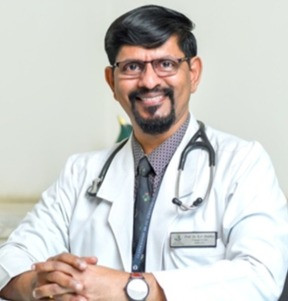Under the aegis of Alzheimer’s Disease International (ADI), people coming together from all around the world celebrate the month of September as World Alzheimer’s Month and commemorates World Alzheimer's Day every year on September 21st. This campaign advocates for an International awareness-raising effort for Alzheimer’s disease (AD) and other dementias.
The theme for World Alzheimer’s Day 2024 is “Know Dementia, Know Alzheimer’s.” Considering the ‘human longevity revolution’ and the ‘human ageing time bomb’; the dementia crisis has been designated as the “the epidemic of our century”. It is estimated that more than 57 million people have dementia worldwide. More than two-thirds of them were in low-and middle income countries (LMICs). In India, data From the Longitudinal Aging Study in India (LASI) estimated that 8.8 million Indians older than 60 years live with dementia. The two most common causes of dementia are Alzheimer´s disease (AD) and vascular dementia. AD accounts for 50-70% of all cases of dementia, about 20-30% have either vascular dementia (VaD) or a combination of VaD and AD, the other dementia syndromes being Frontotemporal dementia (FTD and Dementia with Lewy Body (DLB).
Although ageing is one of the main risk factor for dementia, Dementia is not inevitable with ageing and is best depicted as a disorder on the “continuum of aging casualty”. We need to re- think dementia to be a "lifestyle disorder." Research has shown that AD develops in the life-course of 20-30 years on the background of ageing intricately and inexorably interacting with lifestyle risk factors (LSRFs), behavioural risk factors (BRFs), and Vascular Risk Factors (VRFs) along with other metabolic risk factors resulting in dementia.
The dementia process and brain pathology associated with dementia inexorably creeps in from early-life (20-40 years age group) to mid-life (40-59 years age group). AD is therefore a slow neurodegenerative neuropathological process resulting from cumulative brain pathology over a decades-long process, and is not an event that occurred de novo as a in late-life disorder. By the time AD manifest as symptomatic dementia, the brain neurodegeneration can no longer be prevented. Current treatment into AD is ‘too late’ and offers symptomatic treatment only.
Being a neurologist trained in Memory/Cognitive Disorders and Dementia, I am not being a therapeutic nihilist when much research is underway for novel anti-dementia, anti-amyloid and other drug targets are in the pipeline. However, I wish to reiterate that until such effective, curative or disease modifying drugs are available, both in the developed and developing countries easily/cheaply, preventive neurology strategies will remain the Holy Grail in addressing the dementia epidemic. I fervently believe that Epidemics can only be eradicated by prevention, not by therapy!
Optimism for a life-course perspective to dementia prevention stems from evidence in a recent study published in 2020 as the Lancet Commission Report on dementia prevention. Similar to the much practiced Preventive cardiology and the evidence from the Framingham Risk Score (FRS) that estimates a patient's 10-year risk of cardiovascular disease (CVD); there is now research evidence to similar riskometer tools in dementia. This includes Mid-Life Dementia Risk Score and Late-Life Dementia Risk Index, which can accurately predict the likelihood of older adults developing dementia in the future life-course. This novel approach for the prediction of dementia risk could help to identify individuals who might benefit from intensive brain healthy lifestyle interventions that could stave off dementia in the future.
The evidence from the 2020 Lancet Commission report lends credence that about 40% of dementia cases worldwide could theoretically be prevented or delayed by eliminating 14 modifiable risk factors during an individual's life course. Hence, it’s never too early or too late to act, to make such risk factor strategies at any stage during early or mid-life course. The 14 risk factors cited in the 2020 Lancet Commission report are low education, hearing loss, hypertension, smoking, obesity, depression, physical inactivity, diabetes, excessive alcohol consumption, traumatic brain injury (TBI), air pollution, social isolation, vision impairment, and high LDL cholesterol.
A life-span approach with a life-course approach focussing on Brain healthy Lifestyles, the promotion of Brain health and well-being, and healthy brain ageing (HBA) strategies would exert brain protection by preserving the brain’s cognitive reserve, brain neuroplasticity, brain resilience, and pave the route to a Dementia free life expectancy (DemFLE) operant on ‘The Scaffolding Theory of Aging and Cognition’ (STAC) conceptual model. The brain healthy lifestyles would mandate staying physically fit, adopting an active socially integrated lifestyle, (leisure activities, walking, bicycling, gardening ,playing musical instruments, social networking, visiting friends and relatives, going to movies, Hobbies) staying mentally and cognitively active( brain gym activities such as learning, reading, playing games, sudokos, puzzle games, meditation, yoga), being spiritually active, finding a ‘purpose in life’ (PIL or ‘Ikigai’) ensuring eudaimonic well-being (EWB), eating smart adhering to brain healthy diet (the Asian-Mediterranean diet, diets high in fish, fruit, and vegetables fruits), sleeping well, quitting tobacco and alcohol, and coping stress, depression and anxiety, and by promoting mental resilience for subjective psychological well-being.
In fact, the World Brain Day on July 22nd this year the German Society of Neurology and the German Brain Foundation lend some evidence that too much sugar can harm the brain and impact AD. We should also be ‘Heart Smart’ to be ‘Brain Smart’ by controlling high blood pressure, treating diabetes mellitus, and preventing obesity to maintain a healthy BMI. My advocacy underscores that by improving lifestyle choices apart from controlling the modifiable risk factors would indeed be a public health roadmap for preventing and staving off the risk for future dementia in the next generation, a promise for tomorrow’s generation for DemFLE
This article would not have a 360° perspective by not addressing a sustainable dementia education for our children, grandchildren and for the next generation. Dementia education in children, school professionals, teenagers, adults, and the elderly in our society is quintessential to ‘know dementia, know Alzheimer’s’ as a lifestyle disorder. Our communities and society should be made aware of the “cradle-to- grave’ life-course perspective in preserving brain health, and adopting proactive brain healthy lifestyles as a public health initiative to dementia prevention in India.
“When meditating over a disease, I never think of finding a remedy for it, but instead a means of preventing it”- Louis Pasteur; 1884

Prof Dr.B.P.Shelley, MBBS, MD, DM, FRCP
Fellowship in Behavioural Neurology, Institute of Neurology, London, UK
Fellowship in Cognitive Neurology, Addenbrooke’s Cambridge University Hospitals, UK
Professor and Head - Department of Neurology
Yenepoya Medical College
Yenepoya (Deemed to be University), Mangaluru, Karnataka
Let the Truth be known. If you read VB and like VB, please be a VB Supporter and Help us deliver the Truth to one and all.
Ottawa (PTI): Three Indian nationals have been arrested by Canadian police on an anti-extortion patrol and charged after bullets were fired at a home.
Harjot Singh (21), Taranveer Singh (19) and Dayajeet Singh Billing (21) face one count each of discharging a firearm, and all have been remanded in custody until Thursday, the Surrey Police Service (SPS) said in a statement on Monday.
The suspects were arrested by patrol officers after an early morning report of shots fired and a small fire outside a home in Surrey's Crescent Beach neighbourhood, the LakelandToday reported.
On February 1, 2026, the SPS members were patrolling in Surrey’s Crescent Beach neighbourhood when reports came in of shots being fired and a small fire outside a residence near Crescent Road and 132 Street.
The three accused were arrested by SPS officers a short time later, the statement said.
SPS’s Major Crime Section took over the investigation, and the three men have now been charged with Criminal Code offences, it said.
All three have been charged with one count each of discharging a firearm into a place contrary to section 244.2(1)(a) of the Criminal Code.
The investigation is ongoing, and additional charges may be forthcoming. All three have been remanded in custody until February 5, 2026.
The SPS has confirmed they are all foreign nationals and has engaged the Canada Border Services Agency, it said.
One of the suspects suffered injuries, including two black eyes, the media report said.
Surrey police Staff Sgt. Lindsey Houghton said on Monday that the suspect had refused to comply with instructions to get out of the ride-share vehicle and started to "actively resist."
"As we were trained, he was taken to the ground and safely handcuffed," said Houghton.
A second suspect with a black eye was also injured in the arrest after refusing to comply, Houghton said.
The arresting officers were part of Project Assurance, an initiative that patrols neighbourhoods that have been targeted by extortion violence.
Houghton said the Canada Border Services Agency (CBSA) is also involved because the men are foreign nationals, and the trio may face additional charges.
It's not clear if the men are in the country on tourist visas, a study permit, or a work permit, but Houghton said CBSA has started its own investigation into the men's status.
Surrey has seen a number of shootings at homes and businesses over the last several months, but there's been an escalation since the new year.





